The Benefits of Child Play Therapy Adults frequently assume that children’s play is just a game or a means of passing the time. The development of a child’s mind and emotions are actually aided by imaginative and creative play. Through play, a child develops self-confidence, create a positive self-image, learn to express emotions, make decisions, and acquire skills that will help them prepare for real-life circumstances. As a form of therapy, play can assist a child in coping with and resolving issues that may be impeding his growth. Under therapist supervision, the child will be able to play in a calm environment where he or she will feel safe and comfortable expressing thoughts, feelings, and emotions. Play therapy provides a safe place for a child to play, rather than express thoughts, feelings, and problems. In play therapy, the therapist chooses toys that encourage creativity, such as clay, sand, water, crayons and markers, puppets, and toys that will allow the child to act out real-life scenarios. Play therapy helps to build a rapport of trust between the kid and the therapist and encourages the child to express themselves through play. There aren’t many restrictions placed on the child’s play and actions during a play therapy session. The child usually guides the therapist to the cause of his or her emotional trauma in a safe yet stimulating environment through activities and behavior. Each professional has unique methods for assisting the child in letting go of negative or constricting emotions and establishing coping skills for use in daily life. Emotional crises can occur at any point in a child’s development and play therapy will enable them to adjust to their circumstances or disability. Deep interaction among kids, including play themes, can shed light on underlying unresolved concerns. Children can solve their difficulties in their own unique ways while having fun when they are allowed to engage in free pretend play.
The Benefits of Child Play Therapy
Need Counseling Help & Support?
Schedule An Appointment With A Professional Clinician Who Will Address Your Total Needs
Testimonials
Gainesville Office #1
(703) 754-0636
Fax: (703) 754-0646
Fax: (703) 754-0646
Gainesville Office #2
(703) 754-0636
Fax: (703) 754-0646
Alexandria Office
Haymarket Office
©. All rights reserved. Website Design by NOVA Advertising

